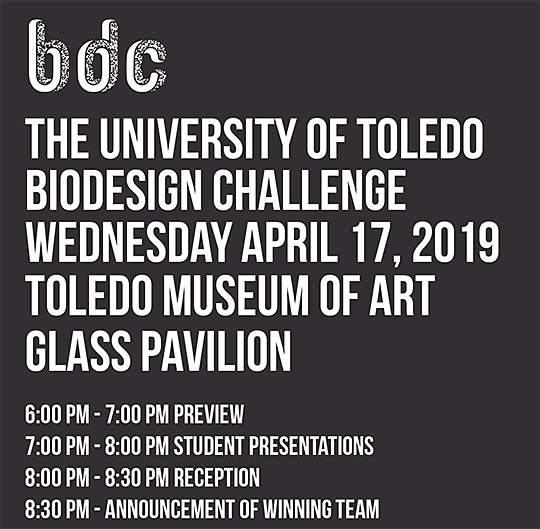On Wednesday, April 17, four groups of University of Toledo students will vie for the chance to compete at the International Biodesign Challenge in June in New York City.
Each group will go head to head at the Toledo Museum of Art Glass Pavilion, where they will present their projects focusing on biotechnology and biomaterials that address complex global challenges.
 The event will start at 6 p.m. with a preview of the students’ work, followed by group presentations at 7 p.m. A reception will start at 8 p.m., and the winner will be announced at 8:30 p.m.
The event will start at 6 p.m. with a preview of the students’ work, followed by group presentations at 7 p.m. A reception will start at 8 p.m., and the winner will be announced at 8:30 p.m.
The first group consists of art students Colin Chalmers and McKenzie Dunwald; bioengineering student Michael Socha; and environmental science student Ysabelle Yrad. Together, with assistance from Tamara Phares, instructional laboratory coordinator in the Bioengineering Department, they created an innovative solution to the problem of microplastics in the environment, working on a genetically modified plant that allows for an increased production of specific proteins.
Group two — art students Tyler Dominguez and Andrea Price; environmental science student Anna Pauken; and bioengineering student David Swain — are collaborating with Dr. John Gray, professor of biological sciences, to design a genetically modified plant with enhanced carbon sequestration, while improving soil quality and rainwater infiltration.
The third group is composed of art student Valerie White; bioengineering students Adam Kemp and Anthony Shaffer; and environmental science student Michala Burke. The four are creating a biological solution to indoor air quality issues utilizing emerging knowledge about the microbiome — micro-organisms in a particular environment.
Group four — bioengineering students Sherin Aburidi and Timothy Wolf; environmental science students Courtney Kinzel and Sarah Mattei; and art student Tyler Saner — is working with Dr. Von Sigler, professor of environmental sciences, to create a non-antibacterial resistant treatment for MRSA and other superbugs.
“The UToledo Biodesign Challenge Course offers students firsthand experience in interdisciplinary research and innovative prototype solutions to real-world issues,” said Brian Carpenter, assistant professor of art.
The class is offered to students majoring in art and design; bioengineering; and environmental science. It is taught by Carpenter and Eric Zeigler, assistant professor of art.
“By crossing philosophy, science, technology, art and design, students explore real-world problems and imagine alternative presentations of space, place, body and environment through interdisciplinary research,” Zeigler said.
Carpenter added, “We really want students to be inspired. We want students to think creatively about the solutions that are required to solve the pressing issues of our time.”